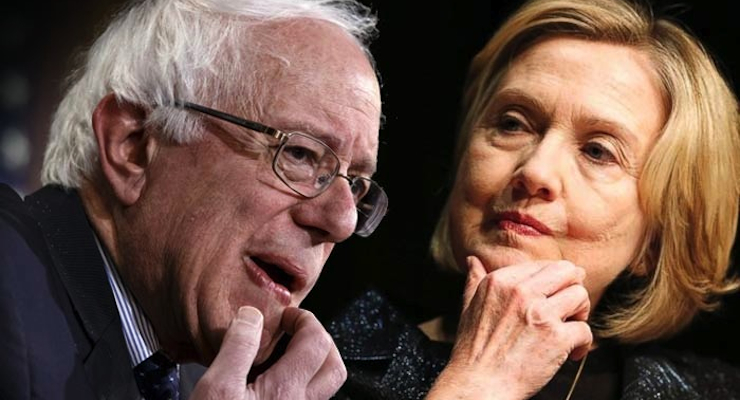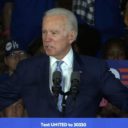

Vermont socialist Sen. Bernie Sanders, left, and former Secretary of State Hillary Clinton, right. (Photo: AP)
Election season is once again in full swing and, once again, major media outlets are proving their preference for pushing a good story over reality. The media, as a whole, want to cover an edge-of-your-seat horserace, filled with ratings-driving suspense. However, for those of you who followed the debut of PPD’s election projection model in 2014, which was hands down the most accurate on the Internet, you know we are in the business of simply telling our readers the truth.
That said, even considering the recent polling surge by Vermont socialist Sen. Bernie Sanders in certain early voting states, the truth is that the race for the Democratic nomination is no horserace. In our first expanded analysis of PPD’s presidential election projection model, we will explain why–despite the email controversy and big crowds flocking to Sanders–former secretary of state Hillary Clinton is still solidly favored (88%) to be the Democratic nominee in 2016. That’s not to say that the factors we will soon list below won’t change, but as of now, Sanders has shown no ability to change the fundamentals that determine the victor in modern day Democratic primary contests. The first, is the Democratic primary process, itself.
Democratic Primary Process (Party Politics & Delegate Allocation)
We have hammered over-and-over that it is a simple fact that there is a strong correlation between establishment support for a candidate and the eventual winner of the Democratic nomination. That is to say, candidates who enjoy the most support from a party’s power-brokers, such as congressional endorsements etc., tend to earn the nomination. Members of Congress, for instance, not only have access to a donor base but also GOTV infrastructure and favorable media coverage. That is particularly true with the Democratic Party. Roughly one-sixth of the estimated 4,483 delegates up for grabs in 2016 will be “superdelegates,” or party leaders able to pledge delegates not bound by voting outcomes in their state. They will have a say in who the party’s nominee will be, whether voters like it or not.
As of now, Hillary Clinton is dominating the superdelegate primary and race for endorsements, the most recent victory being the announcement by former Iowa Sen. Tom Harkin. Even if Bernie Sanders wins the Iowa caucus, and that’s certainly a possibility, it is unlikely to have enough of an impact to overcome Hillary’s establishment and structural advantages within the party and overall primary electorate. It is also a possibility that Clinton’s baggage will become too heavy for the party to carry, which is why they are hedging their bets with Vice President Joe Biden and former Maryland Gov. Martin O’Malley, but that would be a disaster for the party and they know it.
Further, the primary election calendar presents real challenges for Sen. Sanders, particularly considering the Democratic Party allocate delegates proportionately rather than winner-take-all contests. Despite the media (over)-hype, it is not only possible but likely that Hillary would still dominate the nomination process even if she lost in both Iowa and New Hampshire, the latter of which she was actually trailing behind in the most recent poll. The Clinton campaign actually blew her chances in 2008 because they didn’t understand the basic fundamentals of a Democratic primary. They heavily weighted their resources in the first two states and could never recover from their high burn rate because of delegate allocation.
Let’s discuss what happened to Hillary in 2008 and, what will happen to Sanders in 2016, in a bit more detail.
Demographics (Post Iowa & New Hampshire, Election Calendar Tilts to Diverse Electoral Contests)
The bottom line and hard truth is that after Iowa and New Hampshire, the electoral calendar is all downhill for the Sanders campaign. The next two states are Nevada (Saturday, Feb. 20) and South Carolina (Saturday, Feb. 27), where the share of white voters will drastically decrease. In 2008, Hispanic voters in Nevada backed Clinton over Obama by a 64–26 percent margin, and represented roughly 15 percent of the vote. Considering their growth to 20 percent in the overall electorate, it is more than expected we will see rapid growth in their share of the primary electorate in 2016.
It wasn’t a coincidence that Team Obama played the race card on Bill Clinton before the South Carolina primary in 2008. Black voters, a bloc Obama carried by a 78–19 percent margin over Clinton, accounted for more than half of the Palmetto State’s primary electorate. Absent Obama, Clinton will handily win black voters against a 73-year-old white secular socialist from Vermont, who thus far has engaged in little to no outreach within the community. While Sanders has made polling gains in heavily white Iowa and New Hampshire, there has been no movement in South Carolina, not surprisingly.
On March 1, it will only get worse. Black voters in Alabama, Georgia and potentially North Carolina will account for 50 percent or more of the electorate, while Arkansas, Tennessee and Texas will likely all end up in the Clinton column. The only sure victory for Sanders on March 1 will be his home state of Vermont, though Massachusetts and Minnesota are white enough for him to compete. But he has only a slim opportunity to grab a few delegates against Clinton in Virginia. Contests taking place from March 5 through April pose the same challenges for Sanders. An opportunity here and opportunity there, with Clinton victories likely to let the wind out of Bernie’s sails each time he thinks he might be hoisting his sail.
Conclusion
The only person at this point who can defeat Hillary is Hillary, because the worst-case scenario for the Clinton Camp is if the establishment abandoned her in the wake of a serious scandal–like say, being charged with a felony for breaking the Federal Records Act of 1950. Unless Sanders begins to demonstrate a significant appeal among minority voters, he simply cannot win.







